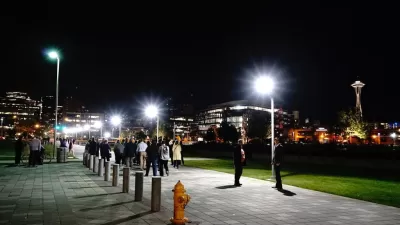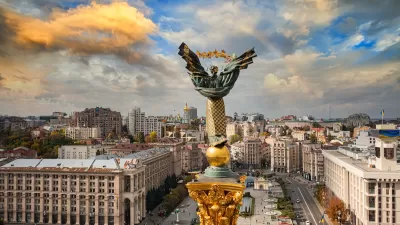Kio Stark, professor at NYU's Interactive Telecommunications Program explains lucidly how strangers and cities are "inherently intertwined."
"The everyday nature of interacting with stranger is a byproduct of urbanization, which has created a culture of dense populations with sparse interconnections," writes Stark. "Living in cities has made strangers into a multitude: we brush past thousands of them every day."
Now, with geolocation services like Foursquare and augmented reality applications on the horizon, what it means to be a stranger is becoming increasingly uncertain. Stark finds social behavior has a close relationship with public space, and the way people move through it. Indeed, she finds that there are "cognitive scientists who study the idea that perception, emotion, and attitudes are the processes of the body moving through space (rather than simply neural signals in the brain)."
FULL STORY: Stranger Studies 101: Cities As Interaction Machines

Planetizen Federal Action Tracker
A weekly monitor of how Trump’s orders and actions are impacting planners and planning in America.

Maui's Vacation Rental Debate Turns Ugly
Verbal attacks, misinformation campaigns and fistfights plague a high-stakes debate to convert thousands of vacation rentals into long-term housing.

Restaurant Patios Were a Pandemic Win — Why Were They so Hard to Keep?
Social distancing requirements and changes in travel patterns prompted cities to pilot new uses for street and sidewalk space. Then it got complicated.

Charlottesville Temporarily Has No Zoning Code
A judge ordered the Virginia city to throw out its newly revised zoning code, leaving permitting for new development in legal limbo.

In California Battle of Housing vs. Environment, Housing Just Won
A new state law significantly limits the power of CEQA, an environmental review law that served as a powerful tool for blocking new development.

Boulder Eliminates Parking Minimums Citywide
Officials estimate the cost of building a single underground parking space at up to $100,000.
Urban Design for Planners 1: Software Tools
This six-course series explores essential urban design concepts using open source software and equips planners with the tools they need to participate fully in the urban design process.
Planning for Universal Design
Learn the tools for implementing Universal Design in planning regulations.
Heyer Gruel & Associates PA
JM Goldson LLC
Custer County Colorado
City of Camden Redevelopment Agency
City of Astoria
Transportation Research & Education Center (TREC) at Portland State University
Jefferson Parish Government
Camden Redevelopment Agency
City of Claremont





























